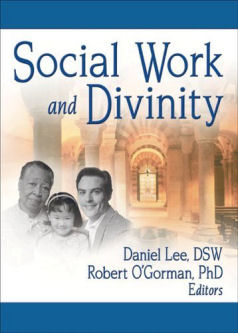
|
Posted September 18, 2005
Book: Social Work and Divinity Editors: Daniel Lee and Robert Gorman The Haworth Pastoral Press, NY, pp. 164 An Excerpt from the Jacket:
An Excerpt from the Book: Joe Holland, an professor of philosophy and religion discusses the past we have come from and the future we face and the need for new thinking and spirituality. Here is an excerpt from his thoughts about the past that captures its impact on our society. The 500 year cycle of modern civilization is now coming to an end. This modern world was a creation of the modern European male Bourgeoisie. Like all civilizations, it has given us rich and abiding gifts, for example, a cherishing of individual human rights, the creation of popular democracy, an explosion of technological creativity, and an expansion of the devotio moderna’s psychologically oriented spirituality of interiority. We need always be grateful for these rich gifts, and make sure we preserve and even expand them for future generations. Modernity’s Foundational Evils But, as with all civilizations, the modern world also contained foundational evils. We might recall first the racial and class exploitations that enable the modern European bourgeoisie to rise to power. These exploitations included: seizing the lands and resources of the native peoples of the Americas while inflicting on many of their peoples a near genocide; enslaving or killing in attempted enslavement nearly 50 million African youth; driving much of the Western European peasantry off thelands which they had worked in common from time immemorial, and then exploiting them as the proletariat of early industrial capitalism; and unleashing a new and brutal wave of industrial colonialism on Africa and Asia. In another foundation evil, modern Eurocentric culture promoted a mechanistic hyper-masculine paradigm of science and technology. Promoted by the modern secular university system and applied to all major institutions, this paradigm progressively marginalized women’s historically essential contributions to socio-economic life. Since the birth of human culture, women’s ways had provided the grounding webs and cycles for the human community and for humanity’s wider community with nature. But modernity suppressed these ancient feminine communal ways and instead gradually tried to restructure all of human experience, beginning with economic experience around the masculine way of competition. This masculine way, also an essential component of social life, was developed over tens of thousands of years mostly in warfare against enemies and in long-distance trading of exotic commodities. The imbalance maximization of the masculine way has resulted today in a colossal masculine global market culture centered both in a gargantuan and dangerous military-industrial complex and in a frenetic and sacrilegious consumerist cult of what Karl Marx called the “commodity fetish.” The whole process is now wrecking vast ecological, societal, and spiritual devastation across the planet. So, at the start of the 21st century and of the third millennium of Christianity, we stand amidst the final and life-threatening climax of the 500-year-old modern attempt to reshape all global community, both societal and ecological, in the Eurocentric bougeois hyper-masculine image. Now we gaze out upon the environmental, familial, and ecclesial devastation of late modern culture. Table of Contents: Introduction Social work and divinity: directions for joining these disciplines in dual degree programs Daniel Lee and Robert O’Gorman The regeneration of ecological, societal, and spiritual life: the holistic postmodern mission of humanity in the newly emerging planetary civilization Joe Holland Developing compassionate communities through the power of caregiving relationships Katherine Tyson Issues, components and theoretical considerations in the integration of divinity and social work curricula Homer U. Ashby, Jr. The role of religion and spirituality in clinical social work: creating a space for integration in MSW/MDiv joint programs Terry B. Northcut The diaconate as dual-skilled ministry: a proposal in support of dual degree programs for formation. Margaret Ann Crain Collaborative responses to the demands of emerging human needs: the role of faith and spirituality in education for social work Edwin M. Conway Integrating religion and social work in dual degree programs Edward R. Canda Teaching about organized religion in social work: lessons and challenges Ram A. Cnaan, Stephanie C. Boddie, Rivka A. Danzig Does a dual degree make a difference in social work: an empirical study Holly B. Nelson-Becker Clinical pastoral education (CPE) and the professional identity of the dual degrees student Robert T. O’Gorman Conclusion: current state of social work and divinity dual degree programs Daniel B. Lee |
|
